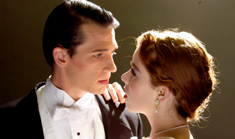Loyola’s production of “Shakespeare in Hollywood” performed its finale last weekend, after successfully putting on six performances. “Shakespeare in Hollywood” is this semester’s last production by the department of drama and speech.
The student cast of 12 acted as characters from the 1936 Warner Bros. Production of William Shakespeare’s “A Midsummer Night’s Dream,” set during the filming. The play consists of behind the scenes looks at the interweaving politics of Hollywood. Leading lady Lydia (drama junior Erin Left) has a romantic relationship with movie mogul Jack Warner (biology sophomore Will Schneider), while producer Max Reinhardt (drama junior Marcus Stanley) shuns the 1930’s “moral hygiene” of Will Hayes (drama communications freshman Sean Dugas) as censorship. And that’s just the start.
When Mickey Rooney and Victor Jory drop out, Oberon (drama sophomore Jonathan Luke) and Puck (drama sophomore Jessica Lozano) arrive, straight from the bard’s work and retaining their magical powers.
Oberon is soon smitten with actress Olivia (drama communications freshman Mary Cobb), admired by Reinhardt, and in a quarrel with Hayes. Just as the fairies interfere with the matters of men in the Shakespeare’s original, Oberon and Puck began casting spells on the rest of the actors, making everyone fall madly in love with each other as they become Hollywood stars during the filming.
But just as the magic starts to make matters more complicated than two really hard math problems, Oberon and Puck are able to lift the magic, and Oberon and Olivia fall even more deeply in love. In the end, it turns out that Puck and Oberon are soon forced back to their forest home, but not before Oberon has a chance to settle his score with Hayes and give Olivia a long farewell.
The dialogue is witty and fast with a pre-filmed scene, clever sets and humorous costuming giving the production a polished appearance. Oberon’s difficulty in naming modern items and tendencies to quote Shakespeare’s body of work – most of which Lydia names – lend his leading character quite a charm. The Scooby-Doo-like action surrounding Hayes receiving his comeuppance is extremely enjoyable.
There was no lack of more deeply touching scenes: Oberon’s final gesture to Olivia is poignant, and Reinhardt’s conviction to liberty in expression is stirring. There are occasional forays into seriousness as Reinhardt recounts the tyrannical censorship during the rise of National Socialism in his home country, but overall, “Shakespeare in Hollywood” was lighthearted.
Matt Smith can be reached at mesmith1@loyno.edu.






